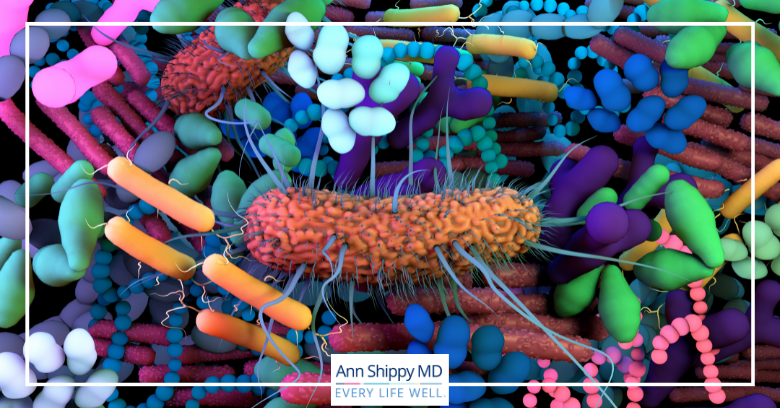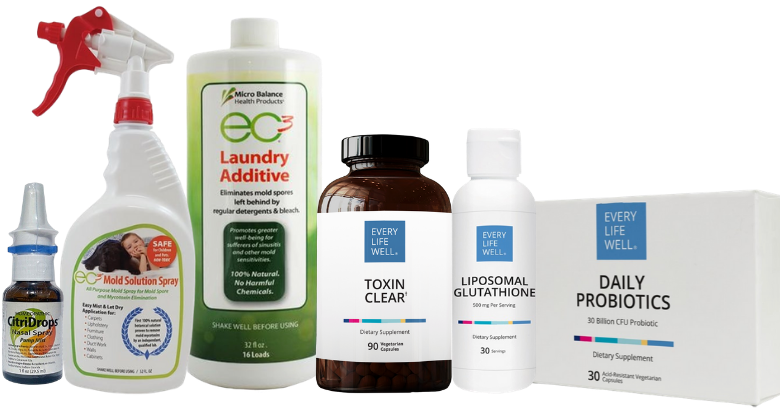The Mycobiome – How Fungi Influence Our Metabolic Health
You’ve likely heard of the gut microbiome – the trillions of organisms that live in your digestive system.
The balance, diversity and abundance of beneficial organisms in the microbiome directly correlate with many aspects of health, including inflammation, metabolic disease, blood sugar regulation, skin health, brain health and so much more.
Research in this field is exploding and we are learning more information all the time about how the microbiome influences health and what we can do to support an ideal microbiome for each of us.
Most of the microbiome research focuses on bacteria, both specific strains of bacteria and larger groups of bacteria called phyla.
But, did you know that the microbiome is made up of more than just bacteria? Viruses, protists, archaea and fungi all play a role, and a positive one at that.
This blog will focus specifically on the gut mycobiome (fungi) – a small but crucial component of the gut microbiome.
You’ll learn what we are uncovering related to the mycobiome and what it has to do with modern diets and metabolism.
Keep reading to get answers to these questions:
- How diet affects the microbiome?
- What is the mycobiome and how is it connected with diet and metabolism?
- How do I support the health of my own mycobiome?
Diet And The Microbiome
It’s well documented that what we eat influences the microbiome and a diet change is detectable in the microbiome in only a matter of days. The microbiome is the interface between our environment (including the food we eat) and our health. Our diet influences the microbiome and the microbiome influences our metabolism.
A strong microbiome may help protect against obesity and metabolic diseases such as insulin resistance, diabetes and fatty liver.
The modern, Western diet that is high in processed foods, sugar and refined carbs may promote dysbiosis, or an imbalance in the microbiome affecting health. Modern diets are linked to high rates of obesity and malnutrition, which in turn affects the immune system and metabolism.
Microorganisms in the gut are important for digestion, energy, nutrient production and more. All of this influences our hormones, neurotransmitters, metabolism and just about every aspect of health that has been studied. As you can see, the microbiome is important for overall wellness.
In short, your diet changes your microbiome, which influences your metabolic fitness. Essentially, your diet either positively or negatively determines your health!
Still, much of this fascinating research has been done on bacteria. We are just beginning to understand the role that fungi play as well.
What Is The Mycobiome? The Mycobiome, Diet and Metabolism
It’s likely not a surprise that fungi in the gut influence metabolic health in much the same way as bacteria. Whole, real food helps to create the ideal condition for health to occur whereas processed food may lead to imbalances and ultimately disease.
Mycobiome refers to the populations of fungi, including yeasts and mold, which naturally live in the gastrointestinal tract.
The mycobiome – and microbiome – when in balance, helps to keep pathogenic organisms in check so they don’t outnumber the good guys.
Typically when we think of yeast and mold, we may think of candida, yeast infections or even the mycotoxins we are exposed to from mold in food or our living environments. Because of this it might be a surprise to learn that some species of fungi are actually natural, helpful and beneficial for the GI tract.
Exciting new research has been published in the journal Nature looking at how the mycobiome of the host (an individual like you or me) influences their metabolism.
In this mouse study, researchers obtained mice with the same genetic background from four different sources. Because of the different environments that the mice came from, they had different mycobiomes despite similar genetics.
A series of tests and experiments were performed to understand the differences in the mycobiome, how diet affects the mycobiome and health. Unlike previous studies, the scientists were able to differentiate yeasts and molds present in mouse feed from the mycobiome itself.
Here’s what the study found:
- Exposure to a processed diet leads to differences in fungi in the gut associated with fat gain, including fat in the liver, compared to a standard diet.
- Fungi from the genera Thermomyces and Saccharomyces are most strongly associated with weight gain and negative changes to metabolism.
- Fungal diversity declines with exposure to a processed diet, as does bacterial diversity.
- Metabolic changes were observed in response to the changes in the mycobiome, including:
- Increased leptin and ghrelin (hormones associated with hunger and weight gain)
- Decreased resistin (a pro-inflammatory hormone produced by fat cells)
- Increased hepatic steatosis, a marker of metabolic syndrome in mice
- Changes in gene expression – epigenetics – related to metabolism were observed related to diet.
The authors conclude that “fungal community composition is strongly associated with host metabolic tone,” which opens the door for more exploration into what this means for humans.
How To Support The Mycobiome
While mycobiome research may still be quite new, there is a lot that we already know about how to support the health of the overall microbiome. Here are some tools to keep beneficial fungi happy and helpful to your health:
1. Eat a diverse whole food diet. Both abundance and diversity are helpful. By eating a large amount of plant foods including non-starchy vegetables, tubers, fruits, nuts, seeds, herbs and spices, you’ll be supporting healthy populations of beneficial microorganisms. It’s recommended to fill half your plate (or more) with veggies and build Paleo meals around that.
In addition, diversity is incredibly important. It’s easy to grab the same produce each week at the grocery store, but mixing it up a little will help to build diversity in both the microbiome and mycobiome. Consider joining a local farm share or shopping at the farmer’s market for access to varying, in season produce.
2. Avoid or limit processed foods, especially those containing refined flours and sugars linked to an unfavorable mycobiome. As the human diet shifted away from an ancestral diet and toward an industrialized one, declines in human health and metabolic function are clear. By returning to a more ancestral pattern of eating, we may be able to reverse this trend. If you need guidance here, the Every Life Well Paleo Protocol is a great place to start.
3. Heal your gut. It’s quite common to have an imbalance of microorganisms in the gut called dysbiosis or pathogenic organisms growing inside of you. Our modern, stressful and toxic, environment greatly affects the microbiome, and likely the mycobiome too. This may be the case whether you have digestive symptoms or not. In Functional Medicine, we often start with a functional stool test (such as the GI MAP) and then a personalized 5 R Protocol to repair the digestive tract and restore the microbiome.
4. Remediate mold. While many fungi that make up the mycobiome are beneficial, toxic mold in the environment severely compromises immunity, detoxification, hormonal balance and other health factors, especially in the most sensitive. (Read more about mold toxicity and common symptoms in this article.) This means inspecting your home, apartment or dorm for hidden (or sometimes obvious) sources of mold. If present, either remediate the problem or move to a safer environment.
5. Live with nature. We live in a time where cleanliness is praised and antibacterial and antimicrobial products are all around us in the form of soaps, hand sanitizers and cleaning products. While these may have their place (and non-toxic options are best), we also need to be careful that we aren’t limiting our natural exposures to helpful microorganisms. Spending time in nature, gardening, playing with pets are all important for microbiome health and immunity. You likely want to wash your hands after being in a public space, but pulling a carrot from the earth and eating it on the spot is likely a good choice.
6. Lifestyle counts. Although diet has a tremendous impact on the mycobiome and microbiome, don’t neglect your sleep, movement, stress management and other forms of self-care. These are incredibly important foundations for microbiome health as well!
It’s incredible that we have this whole ecosystem living in and on our bodies. When working well, it’s a symbiotic relationship: the microbiome has a cozy place to live and we get tremendous benefits to our health. It’s a win-win.
When the microbiome and mycobiome are out of balance, however, so are we. We now have the science to support what Hippocrates said a couple thousand years ago: “all disease begins in the gut.”
The good news is that we have the power to shift and change the ecosystem within simply by what we eat and how we live our lives. Even though the science may be complicated, it doesn’t get much simpler than aligning with nature.
References
- https://linkinghub.elsevier.com/retrieve/pii/S1931-3128(17)30440-7
- https://www.ncbi.nlm.nih.gov/pmc/articles/PMC3298082/
- https://www.nature.com/articles/s42003-021-01820-z
- https://www.thelancet.com/journals/lanmic/article/PIIS2666-5247(22)00203-8/fulltext
- https://www.ncbi.nlm.nih.gov/pmc/articles/PMC3708484/
- Mycotoxin: Its Impact on Gut Health and Microbiota – PMC (nih.gov)













